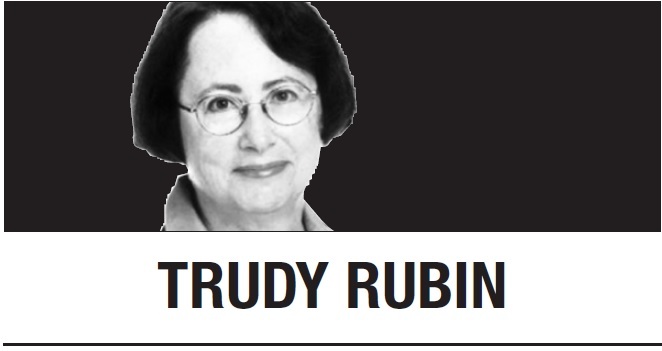The tiny Baltic country of Lithuania has always been ahead of the curve in predicting Russia’s aggressive intentions.
Five decades under Soviet rule, and many more under Russian czars, have left few illusions about Moscow in the elegant Lithuanian capital, Vilnius.
Even before Vladimir Putin’s invasion of Ukraine, Lithuanian leaders warned about the risk he posed to Western democracies. Lithuania was the first to wean itself from Russian energy. It sent Stinger missiles to Kyiv even before Russia invaded.
So I was eager to interview Lithuanian President Gitanas Nauseda when he visited Philadelphia last weekend. He was attending the huge North American Lithuanian Dance Festival -- and promoting trans-Atlantic business partnerships between US and Lithuanian firms.
Nauseda was fresh from the NATO summit in Madrid, which came as Russia was making critical advances in eastern Ukraine. I asked if he thought the summit was successful -- and whether NATO members were doing enough to help Ukraine win.
“We are satisfied with the NATO summit,” the Lithuanian leader said. One reason was NATO’s increased military commitment to defending small Baltic states, which could be quickly overrun by the Russians. The accession of nearby Sweden and Finland to NATO will also help protect the Balts.
Another big reason was the new NATO strategic concept document put forward in Madrid. “Russia is treated as a long-term threat to NATO. We expect NATO will be ready to ... adjust itself to the new reality,” Nauseda said.
But when I asked if NATO members are doing enough to help Ukraine win, Nauseda’s replies got more grim.
“We are not doing enough,” he said, a reference to the allied failure to deliver the long-range anti-missile and anti-aircraft weapons that might have prevented the current Russian advances. These Western weapons are dribbling in, but too slowly and in too small numbers to match the massive Russian advantage in long-range artillery and ammunition, which allows them to destroy Ukrainian towns and soldiers from afar.
“This is a problem, not a problem of lack of will, but of bureaucratic procedures, of slow decision-making,” Nauseda argued. “I hope we will realize this is the very important factor of this war. I see some improvement, maybe not so far today, but tomorrow or after tomorrow when I think it will be possible to accelerate the support for Ukraine.”
Here are more of Nauseda’s observations:
Q: Do European leaders fully grasp the Russian threat? French President Emmanuel Macron said last month that the West must not “humiliate” Russia. Will he push for premature negotiations?
A: I had a conversation on this topic with him. As far as I understand him, he wants to keep the window for negotiation open. But I think even President Macron does not believe in the goodwill of Putin.
We see terrible atrocities committed by Russian forces. We have lost any illusions about the true face of this. This is why we don’t believe, at least in current circumstances, it is very productive to try to convince Vladimir Putin or to talk with him. Diplomacy now has very limited possibilities to change the situation.
The destiny of Ukraine and freedom will be solved on the battlefield, not in diplomatic cabinets.
Q: Is Putin committing genocide?
A: What the Kremlin regime is committing is genocide. It is targeted attacks against innocent people because they are Ukrainians. It is hard to get into (Putin’s) mind. These used to be two brotherly Slavic nations …
Q: What does Putin want?
A: Ukraine is the first step of Putin to reestablish the Soviet empire. He has said the harshest tragedy of the 20th century was the fall of the Soviet empire. He just imagined it is possible to turn time back and return to the Soviet empire in one form or another. He started from Ukraine because Ukraine is not a member of NATO. He thought after military aggression would start there would be chaos in the country, and it would be easy to remove the government and put their puppet government into office. He miscalculated the reaction of the Western world.
Even Sweden and Finland, which are neutral countries, decided to join the (NATO) club because they do not feel safe anymore.
Q: You have said that Ukraine must win. What does “win” mean?
A: It means to push Russians back to the territory of Russia, and probably start negotiations, but from the stronger side. I don’t think so far we are there. So far, unfortunately, the situation is not clear. The Russians are trying to consolidate, trying to isolate Donbas and Luhansk region. The battle is undecided.
Military support for Ukraine will become the crucial factor of this war. It depends on how successful and effective we are in providing military support to Ukraine, because Russian resources are huge, and Russian financial resources are still big, too.
It is important to restore the balance as far as possible. This is the biggest responsibility of all Western Europe, the US, and other allies of NATO.
Q: What if Ukraine loses?
A: I just exclude this scenario. I believe Ukraine will win this war. Of course, this is very important to us (Lithuanians), too, because if it will not be the case, we will be talking about (Russia’s) next targets. Putin’s appetite is unlimited. And this philosophy of reviving the Soviet, Stalinist empire is still there. We should take those risks very seriously.
Trudy RubinTrudy Rubin is a columnist and editorial-board member for the Philadelphia Inquirer. -- Ed.
(Tribune Content Agency)





![[KH Explains] How should Korea adjust its trade defenses against Chinese EVs?](http://res.heraldm.com/phpwas/restmb_idxmake.php?idx=645&simg=/content/image/2024/04/15/20240415050562_0.jpg&u=20240415144419)
